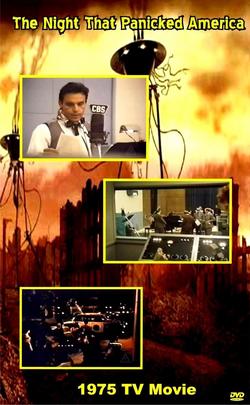
NIGHT THAT PANICKED AMERICA
US, 1975, 100 minutes, Colour.
Vic Morrow, Cliff de Young, Michael Constantine, Paul Shenar, Walter Mc Ginn, Meredith Baxter, Tom Bosley, Will Geer.
Directed by Joseph Sargent.
The Night That Panicked America is a telemovie about an unusual event in the United States in 1938. Orson Welles was a talented young actor-director and had his own company, the Mercury Players. They were noted for their inventive radio programmes. Welles adapted H.G. Wells' The War of the worlds to a contemporary situation and broadcast it.
Thousands of people in the United States picked up the broadcast and thought there was an actual invasion from Mars and panicked. The screenwriters link Welles' presentation with the atmosphere of the late '30s and Hitler and his invasion of the world. The screenplay is co written by Nicholas Meyer, author of the Seven Percent Solution, the fantasy meeting between Sherlock Holmes and Freud, and the director of Time After Time in which H.G.Wells pursues Jack the Ripper in his time machine into 1979. The recreation of the studio work for The war of the worlds is excellent. It is interspersed with a cross-section of stories of ordinary people influenced by the broadcast. This material is conventional but shows the reaction of America. The performances are good and give strength to the impact of the film. The production company put warning notes about the nature of the film at the commercial breaks. In the '70s Orson Welles produced a film about hoaxes called P For Fake in which he discusses this 1938 event.
1. Interest in this story, its fame and reputation, its place in American social history of the '30s? The picture of American society, hysteria and its consequences? The influence of the media? The '30s and Hitler and his war against the world?
2. The recreation of this event for a ham audience? Presenting the studio recreation and the wide situation? Suggesting the period of 1938 and Hitler and war? Showing ordinary people and their lives interrupted by this broadcast? Interest in the situation. identification with it at a popular level? The irony of the warnings by the television company for a 1970s audience?
3. The structure of the film: the preparation for the beginning of the broadcast, the commentator and the noting of time, the studio base and the production of The War of the Worlds, the editing of the subplots and their being interspersed throughout the broadcast? The cumulative effect of the broadcast and people's response?
4. The reputation of Orson Welles in the '30s (and his subsequent career)? His particular dramatic genius? His involvement in hoaxes (F for Fake)? His skill as actor- director? His acting company and their talent? Orson Welles adaptation of The War of the worlds to the situation of the '30s, his radio play and its quality. Skill in adaptation? The presentation of his troupe and seeing them in action, sound effects, acting, music? The manager and his concern? News reports about people's panic? The putting in of the disclaimer? Press reaction at the end? Audience interest in the radio studio recreation?
5. Orson Welles' interpretation of H.G.Wells? Of space and aliens, the possibility of an invasion, the plausibility of it in the eastern coast of America? The effect, human reaction, people in 1938 with radio and the press as the main mans of communication? Their imaginations and visuals? Battles? The importance of the final section of the radio play and its moralising?
6. The choice of the stories of the cross section of people? Illustration of human nature, hysterical response? The cross section of society? People not listening properly and understanding conventions? Ignorance and fear? Hysteria, panic... gullibility? Aggressiveness and the wanting to fight? Ability and inability to cope?
7. The family and the fight and break-up situation, the husband leaving now, the wife's panic? The impact of the programme? Their fear for their children? The decision to leave home, the car. escaping from the apartment. their neighbours and the group trying to flee? The breakdown of the car and their being found in the tunnel? The hysteria and their realising their dependence on each other?
8. San Francisco society, the party, the servants and their listening to the radio, arrogance and the attitudes towards Hitler and World War Two, big business, gullibility, panic and greed? The servants having the last laugh?
9. The people in the roadhouse, drinking and dancing, not believing, the influence of others believing, the man speeding home, attacking the policeman, his arrest?
10. Stefan and his wanting to marry, the minister and his bigotry, his fear at listening to the broadcast? Stefan in the car, his return? His fiancee and her decisions and staying with her father? The minister and his panic in the church his quoting the apocalypse? His humiliation when it was over? His quick consent to the marriage?
11. The father and the son and the dispute about going to war, going out to hunt the Martians, the attack, the shooting of the water tank and their making fools of themselves?
12. The aftermath of the broadcast, the statistics given at the end of the film, press comments? Hysteria throughout the whole United States? The transition to Hitler's voice and panic and the response to him?
13. Human imagination and what can happen?